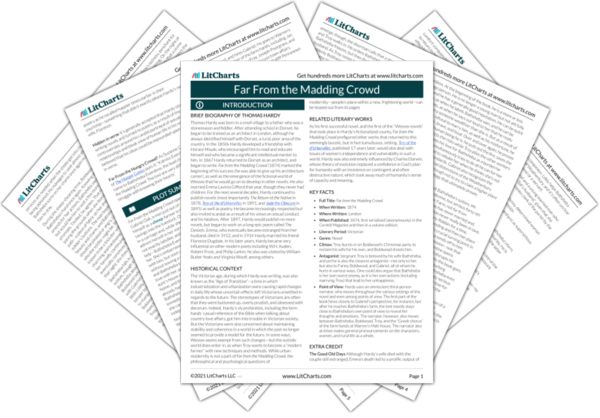Summary
Analysis
To avoid Boldwood upon his return, Bathsheba decides to visit Liddy at her sister’s, as the girl has been granted a week’s holiday to spend there. She’s walked three miles when suddenly she sees Boldwood over the hill. He doesn’t look up until they’re almost face to face. Bathsheba falters and blushes, and he asks if she’s afraid of him—her demeanor so contrasts with his own feelings. He’s accepted that she won’t marry him, he says. Confusedly, Bathsheba bids him goodbye, but as she withdraws, he asks heavily if it’s really final: he asks her for pity, though he’s ashamed to beg her not to throw him off. She says that’s impossible, since she never had him, though he reminds her of her encouragement. That was a childish game of which she now repents, Bathsheba says.
Bathsheba hasn’t quite reached the maturity of dealing with the consequences of her actions directly, rather than obliquely; now, though, she’s forced to confront the man whom she knows she hasn’t treated fairly—even if Boldwood too has been overly insistent on having Bathsheba marry him despite her evident feelings. Boldwood too has a sense of pride, though more than Bathsheba he is willing to undercut it. Once again Bathsheba has to pay the price for the thoughtless game she played—a game from which Liddy, too, was not exempt.
Themes
Boldwood regrets how her jest has now turned to earnestness, and he bemoans how much torture that trick has caused him—she’s the only love he’s ever had. He asks her not to pity him, though again asks what happened to her conviction that she would grow to care for him. Bathsheba repeats that she never promised him anything, and asks him to think more kindly of her, and to forgive her. Still, he claims she must be heartless, though he wavers between renouncing her and begging her to change her mind.
Boldwood seems to want to recapture his pride and insist on his self-sufficiency and independence from Bathsheba, but his feelings for her continually thwart such an attempt, as he tries to get Bathsheba to change her mind. For Bathsheba his stubbornness is yet another price she has to pay, preventing the end of the painful conflict.
Themes
Bathsheba repeats that she’s colder than he thinks, a result of an unprotected childhood in a cold world: resentfully, Boldwood says that’s no reason—she does have the ability to love, and he knows where it’s turned. He begins to rage about Troy, who stole her in Boldwood’s absence: now people laugh at him. He has no further claim on her, Boldwood says, though he’s ashamed. This is all woman’s folly, he adds, but she replies that it’s unmanly to attack a woman this way: there’s no one who can fight her battles for her. But she won’t care if everyone sneers at her. He dares her to deny that Troy has kissed her, and she cannot. Boldwood curses him, while Bathsheba asks him not to, as she loves Troy: but Boldwood continues to rage, telling her to keep Troy away from him. He turns his face and leaves her.
Bathsheba attempts to explain herself to Boldwood by describing how she was raised, alone with her aunt on a country farm, where she had to learn how to manage affairs herself independently of men. But Boldwood is able to see that this is no more than an excuse—he recognizes that, while he’s been gone, Bathsheba has in fact changed from her cool and unpassionate character thanks to the flirtations of Troy. Still, Bathsheba feels attacked once again, held to a higher standard because of her sex, even while she’s unable to defend herself like a man could.
Themes
Bathsheba knows that Troy is about to return to Weatherbury, and fears a quarrel between him and Boldwood. She paces up and down and then sits down on some rocks to think, the dark earth and clouds contrasting with the sparkling stars to the east.
Now Bathsheba recognizes a potential conflict brewing between two of her three suitors, a conflict underlined in some ways by the ominous natural setting.
Themes
Get the entire Madding Crowd LitChart as a printable PDF.













